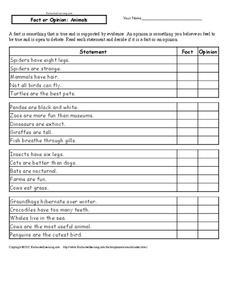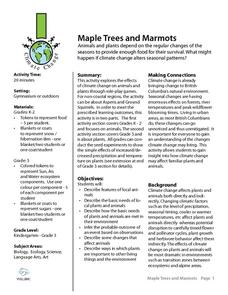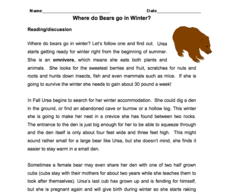Curated OER
Fact or Opinion: Animals
How many legs do spiders have? Is that an opinion, or is it a fact? Complete a worksheet with four sets of five questions about different animals and their attributes, noting whether each statement is a fact or an opinion.
Wild BC
Maple Trees and Marmots
Kinesthetic activities simulate animal activity as the seasons progress in a lesson that introduces climate change to primary pupils. The kids role-play maple trees collecting what they need to survive, but as each year comes...
Core Knowledge Foundation
A Time for All Seasons - Summer
The sun is shining and the birds are singing, what better time to teach young learners about the fun season of summer. In this week-long science series, children learn how the rotation and orbit of the earth influence...
Virginia Department of Education
Evidence of Evolution
What an impression fossils make! In this activity, aspiring paleontologists view fossils and construct a timeline to further understand how the lack of natural adaptation caused historical organisms to become extinct. While they...
Curated OER
Winter
Students explore the concept of hibernation. For this winter lesson, students read Time to Sleep by Denise Fleming and discuss the content of the story. Students participate in classroom activities that require them to develop their...
Curated OER
A Long Winter's Nap
Learners explore the process of estivation, hibernation and torpor and the ways that frogs adapt to seasonal weather changes.
Curated OER
Exploring Animal Habitats: Winter Changes
Students explore animals during the winter months. They discuss the changes that animals make during winter in order to survive. Students discuss migration, hibernation, and staying active during winter months. Students create various...
Curated OER
Chalkboard Challenge
Here's a terrific Jeopardy-style game that's designed for 3rd and 4th grade students of science. The topics include living things, animals, plants, matter, and "hodge-podge." The questions are all age appropriate, and there is an...
Curated OER
Bears/Hibernation
Students study the hibernation process of bears through the making of a bear's cave.
Worksheet Web
Where do Bears go in Winter?
Do bears really sleep for an entire season? Six multiple choice questions and a drawing activity make up a worksheet that tests scholars' comprehension skills after reading about bears during winter.
National Park Service
News Bearly Fit to Print
There are an average of three human fatalities by bears in North America every year, which is low when you compare it to the 26 killed by dogs and the 90 killed by lightning annually. The lesson encourages researching human-bear...
Virginia Department of Education
Weather Patterns and Seasonal Changes
Get your class outside to observe their surroundings with a lesson highlighting weather patterns and seasonal changes. First, learners take a weather walk to survey how the weather affects animals, people, plants, and trees during...
TLS Books
Dictionary Skills Review
Why do we use a dictionary? Your scholars will tell you why while demonstrating their dictionary skills. In addition to stating the purpose of using dictionaries, they will also show what they know about guide words, alphabetizing,...
Get Set for School
Number Formation Chart
Help young learners write their numbers with a number formation chart. It illustrates the way their pencils should move when they make each number, along with a cute story about what each number is doing and thinking as it is being written.
Worksheet Web
Burrowing Animals – Ground Squirrels
Why do ground squirrels build their homes in the ground? What's so unique about these burrows? Have individuals read about this burrowing animal, and then respond to five short answer questions that assess their comprehension of the...
Curated OER
Introduce Vocabulary: From Tadpole to Frog (Pfeffer)
Take an amphibious journey with budding readers as you explore vocabulary in Wendy Pfeffer's informative book From Tadpole to Frog. This text is the backdrop of a vocabulary exercise based on six words: fertilize,...
PBS
Reading Adventure Pack: The Snowy Day
Scholars listen to a read-aloud of fiction and nonfiction books, The Snowy Day, written and illustrated by Ezra Jack Keats, and Snow Is Falling, written by Franklyn Branley and illustrated by Holly Keller, then take part in four creative...
Curated OER
Amphibians and Reptiles
Compare and contrast reptiles and amphibians using a reading guide handout. Although it is designed to accompany a particular textbook, most reading or video selections covering these types of animals will go over the same facts. If you...
Curated OER
Birds and Coffee
Fifth graders identify the changing seasons with how they affect animal and human behavior. They explain what migration is and why many birds migrate south for the winter. They then trace the coffee sold in their neighborhood and in...
Curated OER
Reading Research!
Pupils investigate the life of an animal and how it responds to winter. The lesson plan's focus is on reading and research skills using pictures to assist in the understanding of the information presented.
Curated OER
Pets: Oh Behave
They say that a dog is a man's best friend. Why is that? Discuss with your class why people like pets and the responsibilities with owning one. They read an article about pet behavior and write a short essay comparing one of their...
Curated OER
Wildlife Conservation I
Focusing on the wildlife in their area, learners identify endangered and threatened species and what these animals need to survive. While this lesson involves animals in the Long Island area, it could be adapted for use with any area.
Curated OER
Animals, Soil, Trees
Fourth graders describe the various kinds of soils and how plants and animals are affected by them. They describe the baic needs of plants, scoring at least a 3 or 4 on a 4-point rubic. Students are able to predict and/or infer what...
Curated OER
What Am I?
In this pronoun worksheet, 2nd graders focus on the capitalization and usage of the word "I." Students recopy 9 sentences on the lines provided making the necessary corrections.























